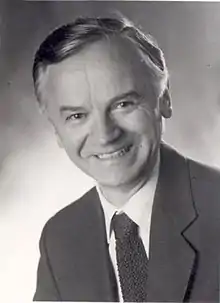Otto Gschwantler
Otto Gschwantler (13 April 1930 – 31 October 2016) was an Austrian philologist who was Head of the Institute for Germanic Studies at the University of Vienna.
Otto Gschwantler | |
|---|---|
 Gschwantler on his sixtieth birthday | |
| Born | April 13, 1930 Tyrol, Austria |
| Died | October 31, 2016 (aged 86) Vienna, Austria |
| Awards |
|
| Academic background | |
| Alma mater | |
| Academic advisors | Otto Höfler |
| Academic work | |
| Discipline | |
| Sub-discipline | |
| Institutions |
|
| Notable students | Rudolf Simek |
| Main interests | Early Germanic culture |
Biography
Otto Gschwantler was born in Brixen im Thale in Tyrol, Austria, on 13 April 1930.[1] His father was a shoemaker. Initially trained as a shoemaker by his father, Gschwantler studied at Ludwig Maximilian University of Munich under Otto Höfler. Gschwantler became a close assistant of Höfler, whom he accompanied to the University of Vienna in 1957. At Vienna, Gschwantler gained his PhD with a thesis on early Germanic literature. For this thesis he was awarded the Sub auspiciis Praesidentis by President Adolf Schärf, which is the highest possible distinction for academic achievements in Austria. Gschwantler was known for his humility.[2] He habilitated under the supervision of Höfler in 1971 with a thesis on Germanic philology.[3] Along with Helmut Birkhan and Peter Wiesinger, Gschwantler belonged to the circle of Höfler's closest students, who jokingly called themselves the "Drachenrunde" ("dragon club").[2]
Gschwantler was a specialist on the Eddas, runology, early Germanic literature and the Christianization of the Germanic peoples. Gschwantler led the Institute for Germanic Studies at the University of Vienna until 1996. In 1992, after a long effort, Gschwantler succeeded in establishing Scandinavian Studies as a distinct study at the University. He eventually retired as professor emeritus, but continued to teach and research, particularly on his native Southern Bavarian dialect.[3]
Gschwantler was a devout Roman Catholic and actively engaged in mountain sports. He contracted parkinson's disease in his later life after a traffic accident, and was for many years admirably cared for by his beloved wife Gertraud. Gschwantler died in Vienna on 31 October 2016 at the age of 86.[2][3]
Selected Works
Otto Gschwantler, Heldensage und Bekennungsgeschichte. Gesammelte Aufsätze zur germanischen Heldensage in der Historiographie des Mittelalters und zur Bekehrungsgeschichte Skandinaviens. Edited by Rudolf Simek. Fassbaender: Vienna 2010.
See also
| Wikimedia Commons has media related to Otto Gschwantler. |
References
Sources
- Birkhan, Helmut (13 November 2016). "Nachrufe auf Univ.-Prof. Dr. Otto Gschwantler". University of Vienna. Retrieved September 6, 2020.
- Reichert, Hermann; Zimmermann, Günter, eds. (1990). Helden und Heldensage: Otto Gschwantler zum 60. Geburtstag. Philologica Germanica (in German). 11. Fassbaender. ISBN 3900538166.
- Tatzreiter, Herbert (7 November 2016). "Nachrufe auf Univ.-Prof. Dr. Otto Gschwantler". University of Vienna. Retrieved September 6, 2020.